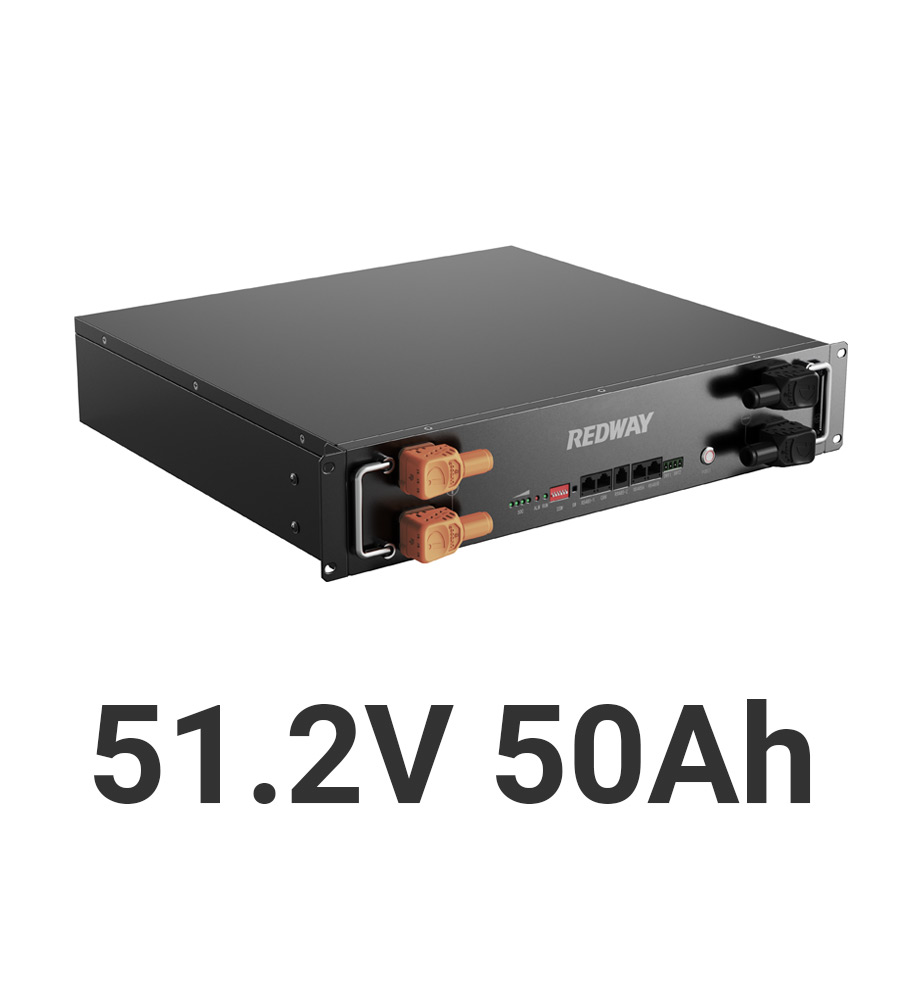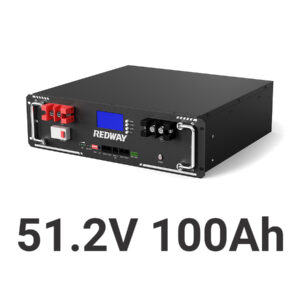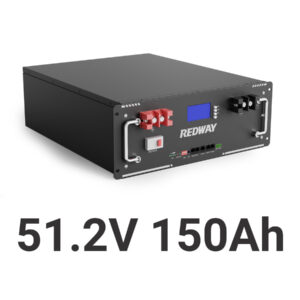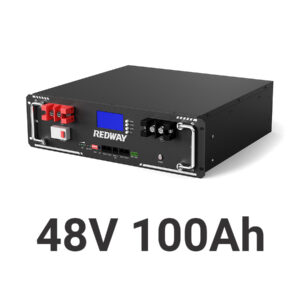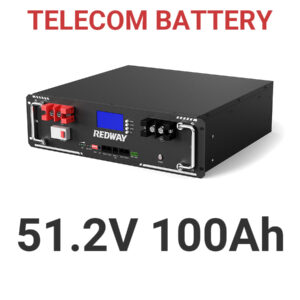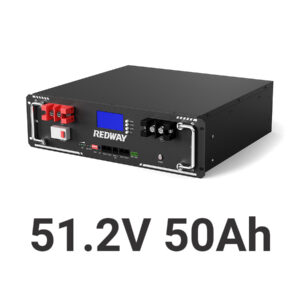Description
Overview
The PM-LV5150-2U-PRO is a high-performance LiFePO4 battery engineered for scalability and durability. Designed for commercial and industrial applications, this 51.2V 50Ah lithium battery delivers 2.56kWh of energy with a compact 2U form factor, making it ideal for OEM integrations and large-scale energy storage systems.
Key Features
Longevity & Reliability: With a design life of 20 years and over 8,000 cycles at 80% DOD, this lithium battery ensures unmatched operational lifespan. Its LiFePO4 chemistry provides inherent thermal stability and safety.
High Power Density: The slim 88mm profile maximizes space efficiency without compromising on 50A continuous charge/discharge capabilities.
Wide Compatibility: Supports integration with leading inverters like Victron, Deye, and Growatt via RS485/CAN-bus communications.
Product Description
As a premier lithium battery manufacturer, we specialize in solutions tailored for OEM partners and wholesale buyers. The PM-LV5150-2U-PRO features a robust metal casing, IP21 protection, and flexible upgrades such as Bluetooth, self-heating, or 4G connectivity. Its JBD BMS ensures precise cell balancing and protection against overvoltage, extreme temperatures (-20¡ãC to 60¡ãC), and short circuits.
Technical Specifications
The battery operates within a 40V¨C58.4V range and weighs just 22kg, simplifying installation. With certifications including UL 1973, IEC 62619, and UN38.3, it meets global safety standards. Parallel configurations support up to 32 units, enabling scalable energy storage from 81.9kWh to 163.8kWh.
Applications & Compatibility
Ideal for solar storage, telecom infrastructure, and off-grid systems, this lithium battery integrates seamlessly with hybrid inverters. Its modular design allows OEMs to customize enclosures, communications protocols, and monitoring tools for turnkey energy solutions.
Customization & Support
We offer extensive OEM flexibility, including bespoke branding, firmware adjustments, and optional features like LCD displays or circuit breakers. Our lithium batteries are backed by a 10-year performance guarantee, ensuring confidence for high-demand commercial projects.
Certifications & Compliance
Compliant with CE, RoHS, and IEC 62133 standards, the PM-LV5150-2U-PRO is engineered for global markets. Its UL 1642-certified cells and MSDS documentation streamline logistics and regulatory approvals.
Group 1: 80V Lithium Forklift Battery Specifications & Benefits
What are key specs of 80V lithium forklift batteries?
80V lithium forklift batteries typically offer 400–600Ah capacity, 3,000–5,000 cycles, and 1–3-hour fast charging. They operate in -20°C to 60°C, weigh 30–50% less than lead-acid, and require no maintenance (watering/equalizing). Voltage ranges from 80V nominal (~88V fully charged). Ideal for high-demand forklifts.
Which forklift models use 80V 400Ah lithium batteries?
Popular models include Hyster H2.5XT-3.5XT, Toyota Traigo 80, and Crown SC 5200/5400 (3–5-ton capacity). These heavy-duty forklifts benefit from lithium’s fast charging, longer lifespan, and zero maintenance, making them ideal for warehouses, logistics, and manufacturing.
How long to charge 80V 420Ah lithium forklift batteries?
An 80V 420Ah lithium battery charges in 1–3 hours with a compatible fast charger, compared to 8+ hours for lead-acid. Partial charging is safe, enabling opportunity charging during breaks without harming battery life.
What safety standards apply to 80V lithium forklift batteries?
They comply with UL 2580, UN 38.3, IEC 62619, and CE standards. Features include built-in BMS (overcharge/discharge protection), thermal stability, and fire-resistant materials, ensuring safe operation in industrial environments.
How to maintain 80V lithium batteries for optimal lifespan?
- Avoid deep discharges (keep above 20%).
- Store at 30–50% charge if unused.
- Use compatible chargers.
- Clean terminals regularly.
No watering or equalizing needed—lithium batteries are maintenance-free.
Why choose 80V lithium over lead-acid for forklifts?
80V lithium batteries last 3x longer, charge 3x faster, and weigh 30–50% less than lead-acid. They require zero maintenance, work in wider temperatures, and enable opportunity charging, reducing downtime and total cost of ownership.
Group 2: 420Ah vs 400Ah Lithium Forklift Battery Comparison
Capacity difference between 420Ah vs 400Ah?
A 420Ah battery stores 5% more energy than a 400Ah model at the same voltage. This translates to ~20Ah additional runtime per cycle, ideal for extended operations. Both typically use lithium (LFP/NMC) or lead-acid chemistries, with lithium offering better usable capacity (100% DoD vs 50% for lead-acid).
Energy density comparison 420Ah vs 400Ah?
Lithium 420Ah batteries maintain similar energy density (150-200Wh/kg) as 400Ah models, as both use identical chemistries (LFP/NMC). The 420Ah’s slightly larger size/weight (~2-5% increase) accommodates extra capacity. Lead-acid versions are 50% heavier for both capacities.
Lifespan advantages of 420Ah over 400Ah?
No inherent lifespan difference—both last 3,000-5,000 cycles (lithium) or 1,200-1,500 cycles (lead-acid) if maintained properly. However, 420Ah’s extra capacity reduces depth of discharge (DoD) per cycle in the same application, potentially extending longevity by 10-15% in high-demand use.
Charging time differences 420Ah vs 400Ah?
Charging times scale proportionally:
- Lithium: 420Ah takes ~5% longer (e.g., 2.1h vs 2h for 80% charge at 1C rate)
- Lead-acid: Both require 8-10h for full charge
Smart chargers adjust current automatically for safe charging.
Cost-effectiveness comparison 420Ah vs 400Ah?
- Upfront cost: 420Ah is 3-8% pricier
- Long-term value: Justified if the extra runtime reduces downtime/battery swaps
- ROI: 420Ah may save more in multi-shift operations where runtime limits productivity
Application suitability for 420Ah vs 400Ah?
- 420Ah: Best for longer shifts, high-throughput warehouses, or outdoor use where charging opportunities are limited
- 400Ah: Sufficient for standard 8-hour shifts with scheduled charging
Both work in forklifts, AGVs, and industrial equipment, but 420Ah optimizes uptime.
Group 3: 80V Lithium Forklift Battery Charging & Efficiency
What defines high-efficiency charging for 80V lithium batteries?
High-efficiency charging means faster charging (1–3 hours), minimal energy loss, and advanced thermal management. It uses smart chargers with adaptive current control to maximize speed without overheating, ensuring 80–90%+ energy conversion efficiency versus lead-acid’s ~70%.
How does 80V lithium forklift battery charging improve performance?
Lithium enables opportunity charging (short bursts without harm), no memory effect, and consistent power output even at low charge. Unlike lead-acid, it avoids voltage sag, ensuring full performance until depletion, reducing downtime.
What safety protocols ensure efficient 80V lithium battery charging?
Built-in BMS (Battery Management System) prevents overcharge, overheating, and short circuits. Chargers comply with UL 2202/UL 62133, featuring auto-shutoff and temperature monitoring for safe, fast charging.
How to optimize charging cycles for 80V lithium forklift batteries?
- Charge at 20–80% for longevity.
- Avoid 0% discharges.
- Use manufacturer-approved chargers.
- Store at 30–50% charge if idle.
What distinguishes lithium from lead-acid in forklift charging?
Lithium charges 3x faster, handles partial charges without damage, and has no sulfation risk. Lead-acid requires full cycles, slower charging (~8 hours), and frequent maintenance.
What industries benefit most from 80V lithium forklift batteries?
- Warehousing/logistics (24/7 shifts).
- Manufacturing (heavy loads, fast charging).
- Cold storage (stable performance in sub-zero temps).
- Ports/railyards (high uptime demands).
Group 4: 80V 420Ah Lithium Battery Maintenance & Safety
How to properly charge an 80V 420Ah lithium battery?
Use a manufacturer-approved 80V smart charger to maintain optimal charging parameters. Charge between 20-80% state of charge (SOC) for daily use, with full charges (100%) only when necessary. Avoid extreme temperatures (<0°C or >45°C) during charging. The BMS will auto-balance cells, but periodic full discharges (every 3-6 months) help recalibrate SOC accuracy.
Best practices for storing 80V 420Ah lithium batteries?
For long-term storage (1+ months):
- Charge to 40-60% SOC
- Store in a cool (10-25°C), dry place
- Recharge to 40-60% every 3-6 months
- Keep away from metal objects to prevent short circuits
- Use original packaging or insulated storage containers if possible
How to monitor 80V 420Ah lithium battery health?
Key monitoring methods:
- BMS data (voltage/cell, temperature, cycle count)
- Capacity tests (annual full discharge/charge cycles)
- IR (Internal Resistance) measurements (rising IR indicates aging)
- Visual inspections for swelling, leaks, or terminal corrosion
Most modern BMS systems provide Bluetooth/app access for real-time tracking.
Temperature effects on 80V 420Ah lithium battery lifespan?
Ideal operating range: 15-25°C
- Below 0°C: Reduced capacity, slower charging
- Above 45°C: Accelerated degradation, risk of thermal runaway
Prolonged exposure to extremes can halve battery lifespan. Use thermal management systems in harsh environments.
Common failure signs in 80V 420Ah lithium batteries?
Warning signs include:
- Rapid capacity loss (>20% in 6 months)
- Voltage imbalance between cells (>0.2V difference)
- Swelling or deformation of battery case
- Overheating during normal use
- BMS error codes or failure to hold charge
Safety precautions for handling 80V 420Ah lithium batteries?
Critical safety measures:
- Always use insulated tools
- Wear protective gloves and eyewear
- Never expose to water or flammable materials
- Follow lockout/tagout procedures during maintenance
- Have Class D fire extinguishers nearby
- Transport with terminal covers installed
- Immediately isolate batteries showing swelling or overheating
Group 5: 80V 400Ah Lithium Forklift Battery Suppliers & Pricing
Top 80V 400Ah Lithium Forklift Battery Suppliers?
Leading suppliers include EnerSys (ODYNE), Green Cubes, Flux Power, and Redway Power. These brands offer high-performance, long-cycle-life batteries with fast-charging and advanced BMS for industrial forklifts.
Certifications for 80V 400Ah Forklift Battery Suppliers?
Reputable suppliers hold UL 1973, UN 38.3, CE, ISO 9001, and IEC 62619 certifications, ensuring safety, reliability, and compliance with global standards.
80V 400Ah Lithium Battery Suppliers’ Competitive Advantages?
- Longer lifespan (3,000–5,000 cycles).
- Faster charging (1–3 hours).
- Lower TCO (total cost of ownership).
- Maintenance-free operation.
Cost-Effective 80V 400Ah Forklift Battery Suppliers?
EnerSys, RELiON, and EcoTree offer competitive pricing with high energy density and extended warranties, balancing upfront cost and long-term savings.
Warranty Policies for 80V 400Ah Lithium Forklift Batteries?
Most suppliers provide 5–10-year warranties, covering defects, capacity retention (70–80% after X cycles), and BMS failures.
How to Evaluate 80V 400Ah Lithium Battery Suppliers?
- Check certifications & compliance.
- Compare cycle life & warranty terms.
- Assess BMS & safety features.
- Review customer feedback & case studies.
- Verify after-sales support & service.
Group 6: 420Ah 80V Lithium Forklift Battery Performance & Applications
What are key specs of 420Ah 80V lithium forklift batteries?
420Ah 80V lithium batteries feature:
• 33.6 kWh energy capacity
• 2,000-5,000 cycles (80% capacity retention)
• LFP/NMC chemistry with built-in BMS
• 500-800A continuous discharge
• -20°C to 60°C operating range
• IP54+ protection against dust/moisture
• 30% lighter than equivalent lead-acid
How do prices compare for 420Ah 80V lithium forklift batteries?
• Lithium: 15,000−25,000
• Lead-Acid: 8,000−15,000
Lithium’s higher upfront cost is offset by:
• 3-5x longer lifespan
• 50% lower energy costs
• Near-zero maintenance
ROI typically achieved in 2-3 years for heavy-use operations
What are advantages of 420Ah lithium batteries over lead-acid?
• 3x faster charging (2h vs 8h)
• Opportunity charging without damage
• 100% usable capacity (vs 50% for lead-acid)
• No watering/equalizing required
• 30% weight reduction improves forklift efficiency
• Consistent voltage under load
What is lifespan expectancy for 420Ah 80V lithium forklift batteries?
• 3,000-5,000 cycles (LFP chemistry)
• 5-10 years in multi-shift operations
• 2-3x longer than lead-acid equivalents
Proper maintenance (20-80% DoD, temp control) maximizes longevity
What safety standards apply to 80V lithium forklift batteries?
Certifications include:
• UL 2580 (safety)
• UN 38.3 (transport)
• IEC 62619 (industrial use)
• CE/RoHS (EU compliance)
Built-in protections:
• Thermal runaway prevention
• Overcharge/discharge cutoff
• Short-circuit protection
Are 420Ah 80V lithium batteries suitable for heavy-duty forklifts?
Ideal for:
• Class IV/V forklifts (4,000-15,000 lb capacity)
• Multi-shift warehouse operations
• Freezer/cold storage applications
• High-throughput logistics centers
Superior performance in:
• Voltage stability under heavy loads
• Fast recharge between shifts
• High-cycle demanding environments

